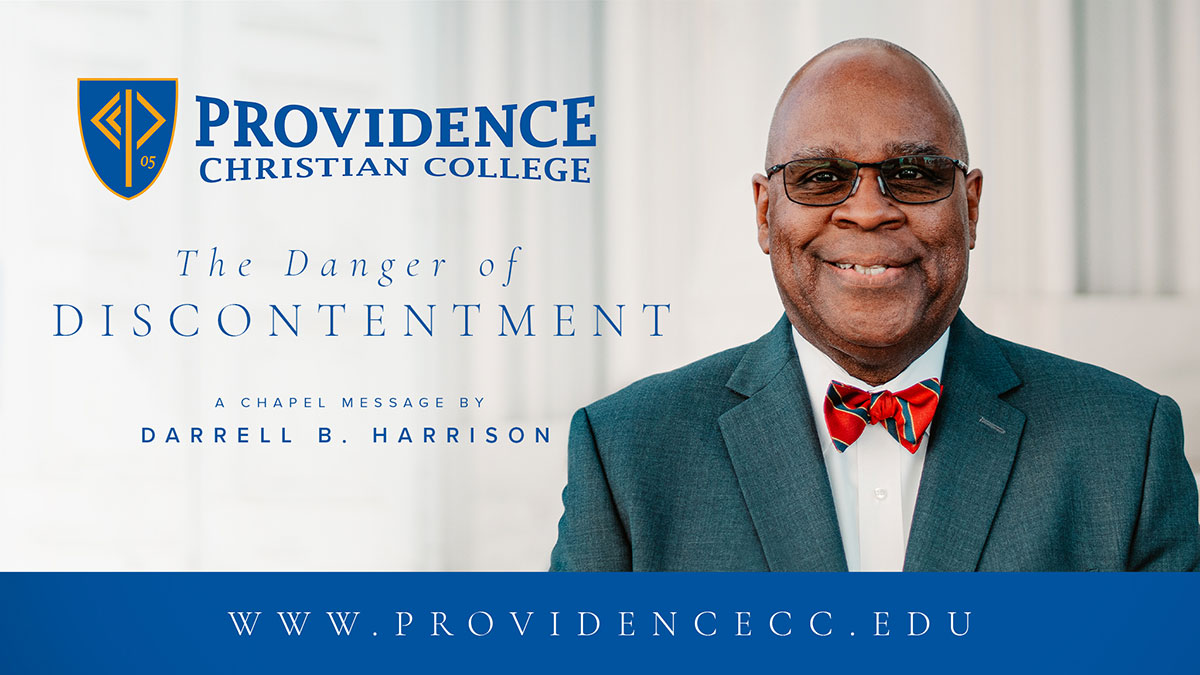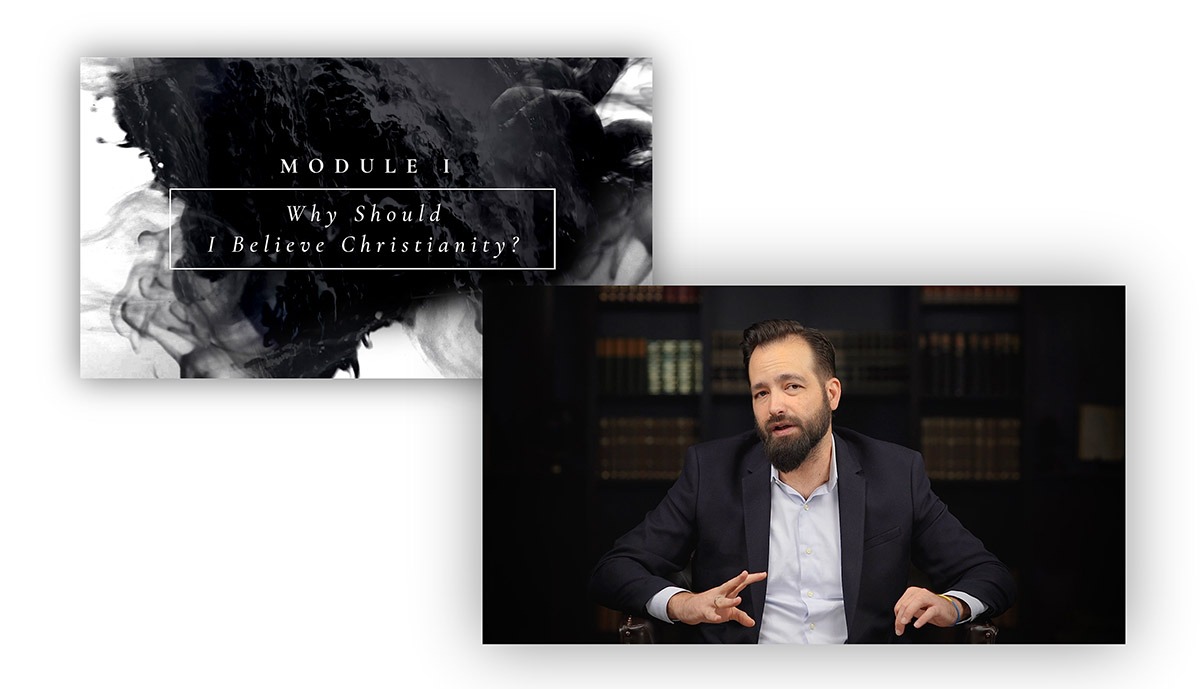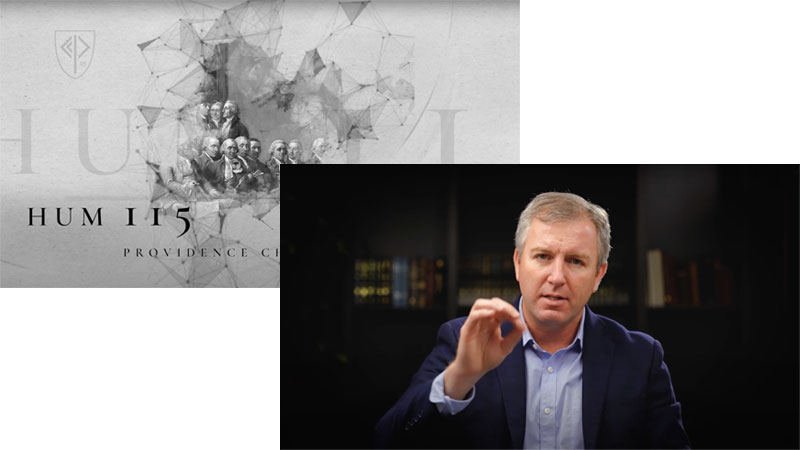by Darrell B. Harrison

“The Danger of Discontentment”
©2022 Darrell B. Harrison
Providence Christian College
Pasadena, CA
Wednesday, April 13, 2022
Thirty-seven years ago, in 1985, the band Prince and The Revolution released its critically-acclaimed album titled Around the World in a Day. The album included two top-10 songs: “Raspberry Beret,” which peaked at number two in the United States, and “Pop Life,” which reached number seven.
Though the somewhat playful and whimsical Raspberry Beret was the album’s most successful single, the song Pop Life is my personal favorite from that album because the lyrics of the song pose some very weighty questions which, I think, warrant our deliberate consideration as Christians.
What’s the matter with your life? Is the poverty bringing u down? Is the mailman messin’ u ’round? Did he put your million-dollar check In someone else’s box? Tell me, what’s the matter with your world? Was it a boy when u wanted a girl? Don’t u know straight hair ain’t got no curl? Life it ain’t real funky, Unless it’s got that pop! Dig it! Pop life, Everybody needs a thrill. Pop life, We all got a space 2 fill. Pop life, Everybody wants to be on top. But life it ain’t real funky, Unless it’s got that pop!
Fundamentally, Pop Life is a song about contentment or, perhaps better, discontentment with the state of one’s life in this world. Pop Life confronts us about the things we desire in this life and our responses when those desires and expectations go unmet.
Christian author Stephen Arterburn comments on that in his book titled Feeding Your Appetites, where he writes this,
“When we settle for unhealthy and unfulfilling imitations of what we really desire, our appetites can begin to rage out of control and start controlling us. We will turn to sources of satisfaction that will eventually turn on us and force us either to give up altogether or to overindulge to the bitter end.”
Many Christians today are discontent with their life. They’ve become emotionally, spiritually, and, in many instances, mentally and psychologically jaundiced from a sense that their life lacks that “pop”—that something—that person, that possession, that experience that they believe will provide them with the degree of fulfillment, significance, happiness, and satisfaction they’ve longed for but have yet to discover.
It was the quest for the “pop life” that was Samson’s problem in Chapter 14 of the book of Judges.
Judges 14:1-4
1 Then Samson went down to Timnah and saw a woman in Timnah, one of the daughters of the Philistines. 2 So he came back and told his father and mother, “I saw a woman in Timnah, one of the daughters of the Philistines; now therefore, get her for me as a wife.” 3 Then his father and his mother said to him, “Is there no woman among the daughters of your relatives, or among all our people, that you go to take a wife from the uncircumcised Philistines?” But Samson said to his father, “Get her for me, for she looks good to me.”
It is both interesting and important to note in that passage in Judges 14, the significance of that little three-letter word: saw. In the Hebrew, the word saw is not speaking merely of Samson’s having perceived or observed the woman in Timnah visually with his physical eyes, but has to do with him allowing what he visualized with his eyes to develop into a sinful desire in his mind and heart. Interestingly, the Hebrew word saw in Judges 14 is the same Hebrew word that is found in Genesis 3, where we have the account of Eve and Adam eating from the forbidden tree.
Genesis 3:4-6
4 The serpent said to the woman, “You surely will not die! 5 For God know that in the day you eat from it your eyes will be opened, and you will be like God, knowing good and evil.” 6 When the woman saw – which is to say, when she perceived in her heart, when she understood with her mind, when she considered with intent, when she purposely deliberated within herself – that the tree was good for food, and that it was a delight to the eyes, and that the tree was desirable to make one wise, she took from its fruit and ate; and she gave also to her husband with her, and he ate.
In commenting on Genesis 3:16, the great French reformer, John Calvin (1509-1564), said this:
“This impure look of Eve, infected with the poison of concupiscence, was both the messenger and the witness of an impure heart. She could previously behold the tree with such sincerity, that no desire to eat of it affected her mind; for the faith she had in the word of God was the best guardian of her heart, and of all her senses. But now, after the heart had declined from faith, and from obedience to the word, she corrupted both herself and all her senses, and depravity was diffused through all parts of her soul as well as her body. It is, therefore, a sign of impious defection, that the woman now judges the tree to be good for food, eagerly delights herself in beholding it, and persuades herself that it is desirable for the sake of acquiring wisdom; whereas before she had passed by it a hundred times with an unmoved and tranquil look. For now, having shaken off the bridle, her mind wanders dissolutely and intemperately, drawing the body with it to the same licentiousness.”
I want to draw your attention for a moment back to Samson and the passage I read earlier in Judges 14, and ask you, my dear brother and sister, as you’re listening to the sound of my voice this morning, is there something of this world that “looks good” to you, something that you know in your heart is completely outside the will of God for you, but that you are nonetheless pursuing because it will make you more content with your life as it stands right now?
Samson knew very well the prohibition God had established against intermarrying with the Philistines. It is a prohibition that is unambiguously laid out by God Himself through Moses in Deuteronomy 7:1-3,
Deuteronomy 7:1-3
1 When the LORD your God brings you into the land where you are entering to possess it, and clears away many nations before you, the Hittites and the Girgashites and the Amorites and the Canaanites and the Perizzites and the Hivites and the Jebusites, seven nations greater and stronger than you, 2 and when the LORD your god delivers them before you and you defeat them, then you shall utterly destroy them. You shall make no covenant with them and show no favor to them. 3 Furthermore, you shall not intermarry with them; you shall not give your daughters to their sons, nor shall you take their daughters for your sons.
You see, Samson’s problem was that he wanted that “pop” in his life. He wanted that one thing that was missing, that one thing that would satiate his self-centered desire to gratify himself regardless of the cost. He wanted it so much, in fact, that he pursued it even against the urging of his own mother and father, not to mention the revealed will of God, as it was set forth in the Mosaic Law. In the end, however, when all was said and done, Samson ended up with more “pop” than he bargained for (Judges 16:15-31).
As I reflect on how things ended up for Samson, I’m reminded of a hymn in which the chorus reads as follows:
Sin will take you farther than you want to go, Slowly, but wholly, taking control, Sin will leave you longer than you want to stay, Sin will cost you far more than you want to pay.
It is this pursuit of the “pop life” which, not unlike Samson, has today led many professing Christians astray. In their misguided zeal to appease, mollify, and assuage their feelings that their life “ain’t real funky,” they often find themselves in the midst of regretful situations and circumstances they thought they would never encounter while, conversely, reaping devastating consequences that they thought they would never experience.
But such is the subtle—and deceptive—allure of sin. As the seventeenth-century Puritan theologian Ralph Venning (1621-1673) writes in his book The Sinfulness of Sin:
“One sin, though committed but once, is one and once too much. Besides, when the Serpent’s head is in, it is hard to keep out the whole body; one makes way for the other. It is almost impossible to sin once and only once.”
At its most fundamental level, discontentment is rooted in misplaced affections. It’s really as simple as that. Discontentment is a failure on our part to seek the things above, rather than the things that are on the earth (Colossians 3:1-3). And our affections, for better or worse, are always a matter of the heart. Jesus said, “For where your treasure is, there is your heart also.”
The 17th-century Puritan, Thomas Watson (1620-1686), in his classic work A Body of Divinity, said this about our misplaced affections:
“These, as the strings of a violin, are out of tune. They are the lesser wheels, which are strongly carried by the will, the master wheel. Our affections are set on wrong objects. Our love is set on sin, our joy on the creature. Our affections are naturally as a sick man’s appetite, who desires things which are noxious and hurtful to him; he calls for wine in a fever. So we have impure lustings instead of holy longings.”
Whereis your treasure today, my friend? Where are your affections? Perhaps a better question would be: What are your affections? I ask that because to answer the latter question is to also answer the former. In other words, it is the “what” that answers the“where.”
The 17th-century Puritan writer William Greenhill (1591-1671), in his book titled Stop Loving theWorld, says:
“If we are to stop loving the world, let us look much at the other world. There is another world … There is a world to come, and that world is a better world than this world . . . If we are to get our hearts off the world, which is a very necessary thing, then we must guard our hearts with all diligence. Look as attentively to your hearts as to your eyes, to the food you eat, to your entire life. Keep it with all diligence.Look to your affections and do not let them rove and wander up and down in the world, ranging here and there.”
At the root of all discontentment is a heart that has lost sight of what Jesus said is the“foremost” commandment: to “Love the Lord your God with all your heart, and with all your soul, and with all your mind, and with all your strength.”
Though not often considered in biblical or theological terms, discontentment is sin. Discontentment is sin because it is evidence that we treasure something—or someone—more than we treasure Christ. Discontentment pridefully declares to the One who willingly paid our sin-debt on the cross, “Sorry, Lord, but You’re just not enough for me. I want more.”
It is the height of arrogance and pride for any professing believer to refer to Christ as ‘Lord,’and yet somehow regard Him as insufficient to satisfy us solely on the basis that our self-absorbed life“ain’t got that pop.”Consider the audaciousness of such a self-centered mindset in light of these words from the Puritan theologianThomas Watson(1620-1686) who, in his book titled The Art of Divine Contentment, declared,
“Ina word,a contented Christian, being sweetly captivated undertheauthority of theWord[of God],desires to bewholly at God’sdisposal and iswillingto live in thatsphere and climatewhereGod has set him.”
Do those words describe you this morning? Can you honestly say, as Watson asserted, that you are “willing to live in that sphere and climate where God has set” you? It’s an important question because the sin of discontentment is the attitudinal gateway drug to other sins.
Discontentment is such a destructive sin that if left unaddressed it can—and will—decimate everything in its path, including your relationships with other people.
- It is discontentment that leads husbands and wives to engage in adulterous relationships with people other than their spouse, under the mirage that they’ll find the “happiness” they’re searching for with someone else.
- It is discontentment that motivates many professing believers in Christ to take on financial obligations that they would not otherwise commit to.
- It is discontentment—the desire for the “pop life”—that contributes to increasing numbers of Christians falling into an abyss of spiritual depression and all manner of addictions (from which many of them do not recover).
The 19th-century Baptist preacher, Charles Haddon Spurgeon (1834-1892), who is often referred to as the ‘prince of preachers’ said,
“Contentment is one of the flowers of heaven, and if we would have it, it must be cultivated. It will not grow in us by nature; it is the new nature alone that can produce it, and even then we must be especially careful and watchful that we maintain and cultivate the grace which God has sown in it.”
The English writer and lay theologian, Gilbert Keith Chesterton (1874-1936), more commonly known as G.K. Chesterton, expressed a similar sentiment as Spurgeon when he said,
“True contentment is a thing as active as agriculture. It is the power of getting out of any situation all that there is in it. It is arduous and it is rare.”
We know from 1 John 5:19 that “the whole world lies in the power of the evil one.” It is against the backdrop of that spiritual reality that I’m reminded of these words from the Puritan theologian John Flavel (1627-1691) who rightly said,
“Christ has not freed believers, in this world, from the temptations and assaults of Satan: even those that are freed from his dominion are not freed from his molestation.”
One manifestation of the Satanic “molestation” of which John Flavel speaks is that this sinful world is absolutely unrelenting in its efforts to convince you and me that to live for Christ is to somehow miss out on the best things that this passing, temporal world has to offer.
The mainstream media, the Internet, social media, television, and even certain elements and aspects of the evangelical church are incessantly beckoning us to come up with some reason, some excuse, and some ethical or moral loophole by which we can compromise our biblical confession with a world that wants nothing to do with God or with His Word. Christ has already given you and me everything we need—in Himself—whereas the world gives us nothing that is of any lasting value or worth.
The Scriptures declare in 2 Peter 1:3, that “His divine power has granted to us everything pertaining to life and godliness, through the true knowledge of Him who called us by His own glory and excellence.” To be a Christian is to turn one’s back to the world; and yet it is the pursuit of the “pop life” that invariably draws us toward the things of the world and away from the things of God (Col. 3:1-3; 1 Jn. 2:15-16). To again quote Thomas Watson from The Art of Divine Contentment:
“Discontent takes the heart wholly off from God and fixes it on the present trouble, so that a man’s mind is not upon his prayer but upon his cross.”
Listen, a “discontented Christian” is a living, breathing oxymoron; a contradiction in terms.
I say that in light of 1 Thessalonians 5:18, which says, “In everything give thanks, for this is God’s will for you in Christ Jesus.” The word “everything” in that verse is the Greek adjective pas, which translated means all, each, any, the whole, and things of all types. In other words, the professing believer in Christ is to be genuinely thankful to God for all things – literally – and without exception!
In his book Contentment, Prosperity, and God’s Glory, the Puritan Jeremiah Burroughs (1599-1646), said,
“The wheels of a good watch will stay in constant and steady motion, even if a man sits on it or if it is dropped or thrown around. So it is with the heart of a man; if there is grace within and the wheels work rightly, grace will keep the heart steadfast. Let the conditions be as various as possible, whether tossed up or down, this way or that way; the heart will stay the same . . . So in a constant way, whether in prosperity or adversity, the gracious man will still respond consistently before God. If God brings illness upon him, he rejoices in God and blesses Him; you will find pleasant and spiritual things coming from him even then. And if God delivers him and he comes into prosperity, there you will find that his heart still remains heavenly. It remains gracious, spiritual, and raised above created things no matter which condition he is put into.”
One of my favorite verses in the entire Bible is Ecclesiastes 7:14 which, in the New American Standard translation, reads: “In the day of prosperity be happy, but in the day of adversity, consider—the Lord has made the one as well as the other.”
It was Charles Haddon Spurgeon who said, “So long as we are receivers of mercy, we must be givers of thanks.”
The cure for discontentment is gratitude.
Think about it, beloved in Christ. How can you or I or any professing believer in Christ be discontent knowing that Jesus willingly shed His blood on a cross for the forgiveness of our sins? Do you think you have a right to be discontent? If so, I humbly urge you to consider carefully these words from Lamentations 3:39: Why should any living mortal, or any man, offer complaint in view of his sins?
Consider that text in light of these sobering words from the 17th-century Puritan, George Swinnock (1627-1673), who said:
“We take the size of sin too low, and short, and wrong, when we measure it by the wrong it doth to ourselves, or our families, or our neighbors, or the nation wherein we live; indeed, herein somewhat of its evil and mischief doth appear; but to take its full length and proportion, we must consider the wrong it doth to this great, this glorious, this incomparable God. Sin is incomparably malignant because the God principally injured by it is incomparably excellent.”
So, tell me, my friend, what’s the matter with your life this morning? Is the poverty bringing you down? Is the mailman messing you around? Did he put your million dollar check in someone else’s box? What’s the matter with your world? Was it a boy when you wanted a girl? Don’t you know straight hair ain’t got no curl?
John Flavel, in his book Christ: Altogether Lovely, which I encourage you to read, said,
“Esteem nothing lovely except as it is enjoyed in Christ, or used for the sake of Christ. Love nothing for itself, love nothing separate from Jesus Christ. In two things we all sin in love of created things. We sin in the excess of our affections, loving them above the proper value of mere created things. We also sin in the inordinacy of our affections, that is to say we give our love for created things a priority it should never have.”
Listen, the goal of the Christian is not to live a life that’s “funky,” but to live a life that’s holy.
The Bible speaks of a man in Ecclesiastes 2:1-2 who endeavored to live a life that was “funky,” but who ended up lamenting to himself, “Come now, I will test you with pleasure. So enjoy yourself.” And behold, it too was futility. I said of laughter, “It is madness,”and of pleasure,“What does it accomplish?”
In hisCommentary on Hebrews 13:5, the noted Bible expositorMatthew Henry had these encouraging words to say,
“Having treasures in heaven, we may be content with mean things here. Those who cannot be so, would not be content though God raised their condition. Adam was in paradise, yet not contented; some angels in heaven were not contented; but the apostle Paul, though abased and empty, had learned in every state, in any state, to be content. Christians have reason to be contented with their present lot. This promise contains the sum and substance of all the promises; I will never, no, never leave thee, no, never forsake thee. In the original [language] there are no less than five negatives put together to confirm the promise: the true believer shall have the gracious presence of God with him in life, at death, and forever. Men can do nothing against God, and God can make all that men do against his people to turn to their good[Romans 8:28].”
As I close, I wanttoquote again thePuritanJeremiah Burroughsfromhis book titled The RareJewel of Christian Contentment, where hehas these edifying words for ustoday:
“If a man is to be free from discontent and worry it is not enough merely not to murmur, but you must be active in sanctifyingGod’s name in the affliction. Indeed, this will distinguish it from [merely being] a sturdy resolution not to be troubled. Though you have a sturdy resolution that you will not be troubled, do you make it a matter of conscience to sanctify God’s name in your affliction, and is this where your resolution comes from? That is the main thing that brings quietness of heart and helps against discontent in a gracious heart. . . The desire and care your soul has to sanctify God’s name in an affliction is what quiets the soul, and this is what others lack.”
If you area Christian who is harboring a heart-attitude of discontentment, I humbly urge you to confess and repent of your sin and to plead with God to help you recognize and appreciate anew the blessed reality that, in Christ, you have everything you will ever need to live contentedly and joyously, not only in this life, but also in the life to come.
Soli Deo Gloria!
Darrell B. Harrison
DARRELL B. HARRISON
Darrell B. Harrison serves as Dean of Social Media at Grace to You, the media ministry of John MacArthur, pastor-teacher at Grace Community Church in Sun Valley, CA.
In his role at Grace to You, Darrell is responsible for overseeing the ministry’s social media strategy. Darrell has a blog called “Just Thinking . . . for Myself,” which, as of March 2022, has more than 74,000 subscribers. He is also lead host of the Just Thinking podcast, one of the most influential long-form Christian podcasts in the world, with more than 4.7 million episodes streamed since its debut in December, 2017.
Darrell is a 2013 fellow of the Black Theology and Leadership Institute (BTLI) at Princeton Theological Seminary (PTS) in Princeton, New Jersey, and is also a 2015 graduate of the Theology and Ministry program at PTS. He is currently in the final phase of certification as a biblical counselor with the Association of Certified Biblical Counselors (ACBC).
Darrell and his wife Melissa reside in Valencia, California. They have three adult children—Collin, Naomi, and Yasmine—each of whom resides in their native state of Georgia.







